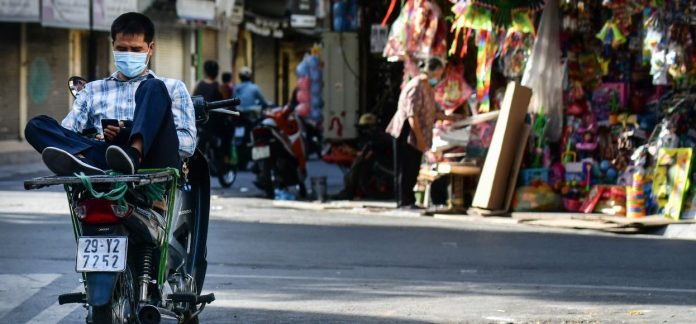Collective strikes by app-based drivers in Vietnam are using strategies previously employed by workers from more traditional sectors. As petrol prices rise, the heat is on the app companies to respond to growing demands for change.
Vietnam’s industrial working class has become famous for its militancy over the past 20 years. Workers in factories producing for export in particular have undertaken thousands of strikes demanding better pay and working conditions. These strikes have largely been successful. All strikes have been organised by workers themselves outside the country’s state-led union federation, the Vietnam General Confederation of Labour. Workers organise in dispersed and decentralised ways, building networks of solidarity and communicating in person and through social media, such as Facebook groups.
But strike numbers in industrial sectors have fallen in recent years. Besides labour activism in Vietnam’s garment industry, it is likely that we will see more strikes and labour activism in other sectors, such as app-based driving. It seems like this is already happening, especially among moped drivers.
This raises a conceptual issue. App-based drivers in Vietnam, as previously noted, are still classed as self-employed independent contractors, not workers. How, then, can one strike when technically self-employed? In this context, ‘strike’ means drivers collectively deciding to, simultaneously switch off or refuse to accept jobs from the targeted app. It also often involves drivers gathering in front of the app companies’ offices. These actions are not classed as strikes or counted in Vietnam’s official statistics. They are also rarely referred to as strikes or collective work stoppages in the media, but more often as “collective app switch-offs” (đồng loạt tắt app).
In other countries, app-based drivers have used their self-employed status to their advantage when it comes to striking. As they are not subject to the restrictive strike laws which control formal employees, the former have more freedom to collectively stop work whenever and wherever they wish. In Vietnam, however, while those officially classed as workers are technically subject to strike laws, they have not respected the law and have ignored the complex and bureaucratic strike procedures when organising actions. App-based drivers, not technically subject to such restrictions, follow in this militant tradition.
The way app-based drivers’ strikes are organised also mirrors strikes in the industrial export manufacturing sector. They are decentralised and networked, with social media channels, especially Facebook groups, playing essential roles in terms of organising, communication, debate and decision-making. This closely follows the model of decentralised resistance previously found in Vietnam’s garment sector. Perhaps former factory workers who have moved into app-based driving—either as a side job or a full-time job—are bringing their experiences of industrial militancy into this sector and teaching others these forms of organising strikes.
This has not been enough, however, to stop the strikes, which have grown in number and frequency in the face of continually rising petrol prices.
From an initial exploration into strikers’ demands at the end of 2020, analysing 13 strikes, a major grievance of the drivers was the high levels of commission taken by the app platforms (a complaint in nine of the strikes). Bonus levels were demands in six strikes while demands about tax levels featured in three. All of the strikes were “defensive strikes”: they were opposing changes rather than demanding improvements.
There were fewer strikes over the Covid-19 pandemic period as drivers were unable to work, but in recent weeks a new trend has developed and seems to be gathering pace – strikes over the price of petrol. Following global trends, petrol prices in Vietnam are increasing rapidly, from a fairly standard price of 23,000 đồng (US$0.99) per litre at the beginning of 2022 to nearly 33,000 đồng (US$1.42) per litre as of 21 June. A moped driver can travel around 45 to 60 kilometres per litre of petrol. For app-based drivers, who shoulder all of their own costs, this is a significant increase in expenses that seriously impacts their take-home income.
These pressures first translated into labour activism in March 2022, when ride-hailing and delivery drivers working for a number of apps including Be, Gojek, Grab and ShopeeFood, launched collective app switch-offs to protest high and rising petrol prices. Drivers were demanding that companies increase customer fees per ride or order, and/or reduce the level of commission they take per job. Some companies did that: Grab and Gojek, for example, both increased fees per ride, while Be reduced the cut it takes per job for car taxi drivers (but not moped drivers).
This has not been enough, however, to stop the strikes, which have grown in number and frequency in the face of continually rising petrol prices. The drivers’ demand that companies reduce levels of commission has also become louder. Some drivers are abandoning app-based driving entirely due to rising costs. Recently, the Ho Chi Minh City Department of Transport has expressed concern that the app switch-offs could lead to congestion at Tan Son Nhat, the country’s busiest airport, which is notoriously over capacity, especially entering the busy summer travel season. The Department has asked the airport authority to monitor the situation and implement measures to ensure order and safety.
With app drivers having to bear all of the increasing costs, the app companies’ unwillingness to reduce their commission levels makes it difficult to see how the current wave of app-based driver labour activism will be resolved or end any time soon. Hanoi may have to step in and take over the steering wheel. BY JOE BUCKLEY/ FULCRUM




